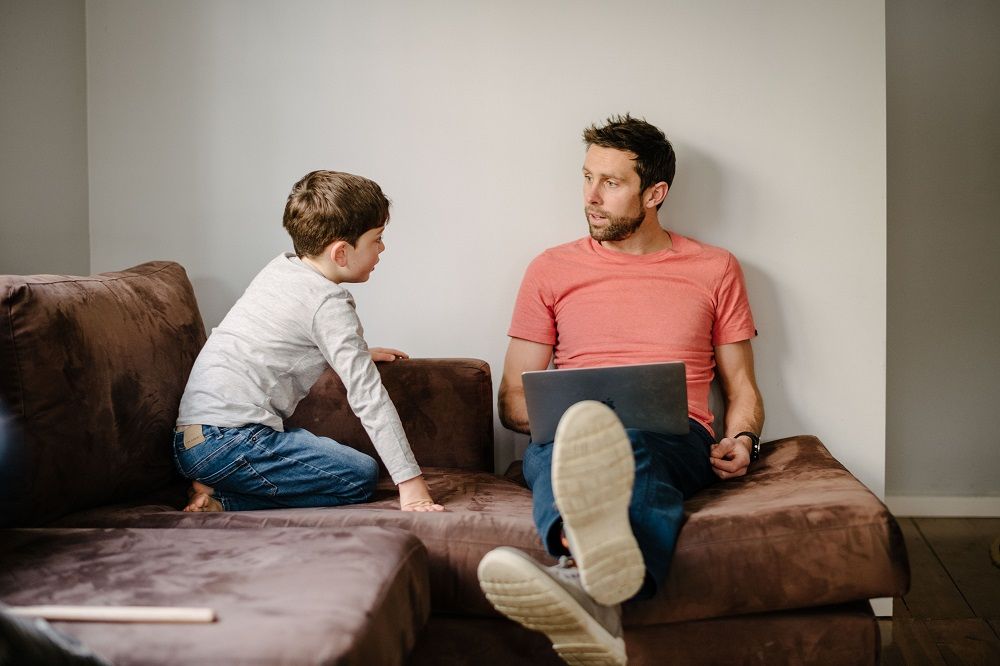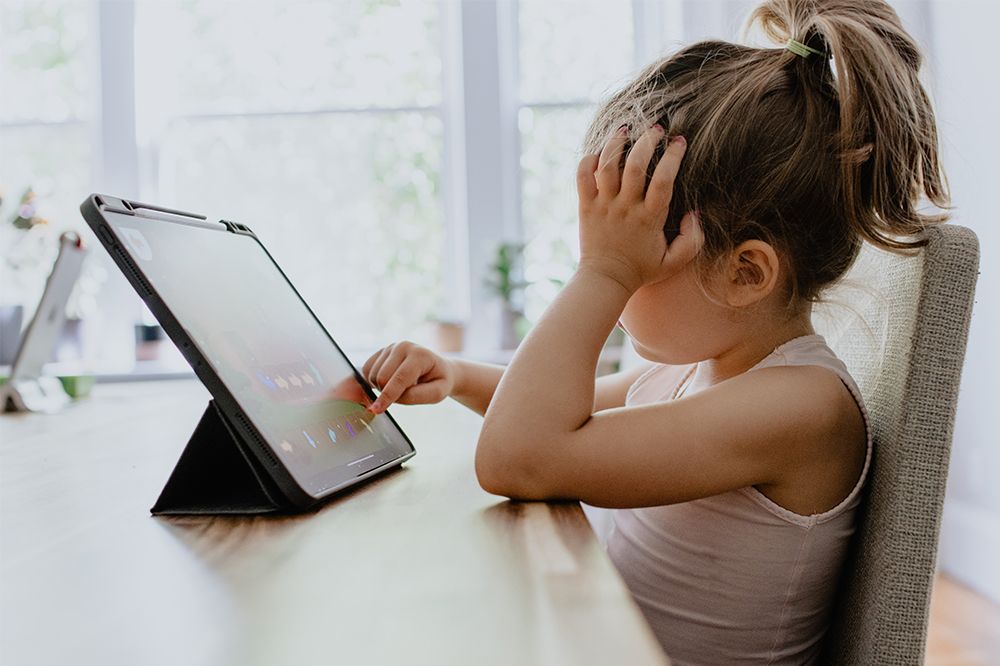Healthy Screen Time For Kids
Key points:
- Not all screen time is equal. Screens can be used positively but excessive use, or viewing the wrong sort of content, can negatively impact your kids.
- Check out how much screen time your kids should have according to their age.
- Set boundaries on screen usage, and enforce discipline strategies if your children don’t follow the rules.
- Social media can be a minefield. Try not to introduce it to your kids until they’re 13 years old, and teach them how to behave appropriately online to avoid bullying.
Raising a child in the 21st century has its fair share of challenges. Screens and the internet have really changed the parenting game, sparking genuine concerns like, ‘How should my kids interact with screens?’, ‘Are screens bad for them?’ ‘What rules should I be enforcing?’
If you’re not feeling confident about how to tackle screen time, you’re not alone. It can be confusing for a lot of parents. But we’ve got you covered with evidence-based tips and insights into setting healthy limits on screen time for your kids.
Are screens bad for children?
Screens can be harmful for kids, but they can also be hugely beneficial for their development. Let’s explore that a bit.
On the flip side, video games and TV programs can promote learning (consider the likes of Play School and Sesame Street). Screen time can help kids develop important creative, problem-solving, communication and social skills.
Like anything, there are positives and negatives but here are a few things to consider.
Devices used
Television, iPad, smartphone, laptop, desktop computer – talk about device overload. You’ve probably got a handful of these at home, or maybe all of them. Screen time includes use of any of these devices.
When selecting devices to introduce to your kids, consider how they can be used positively. For example, educational television shows or iPad games could be beneficial but addictive smartphone games (we’re looking at you, Angry Birds) could create frustration and lead to tantrums when screen time comes to an end.
Content viewed
If your child is old enough to use a device themselves (and let's be honest, they’re probably better at it than you are), it’s important to think about how you’ll control what types of content they can access. You don’t want to leave them in front of Play School, and come back to find them wide-eyed watching Deadpool.
Good quality screen content for kids will:
- Promote positive messages, like sharing and getting along as a family.
- Spark creative ideas for off-screen play, like pretending to work in a shop as the characters of a TV show do.
- Encourage physical activity, like singing and dancing along to a song with actions.
- Require involvement, like answering questions.
Here are some tips for monitoring screen time content:
- Watch out for content that could contain scary, violent or sexual themes, or advertising-heavy materials.
- Encourage your kids to engage in screen time in shared household settings like the lounge room instead of their bedroom, so you can more closely monitor content.
- Consider installing programs or filters that can block access to inappropriate sites or content.
Time spent
It’s obviously not great for your kids to be glued to a computer screen for eight hours a day. (Same goes for you, actually.) Limiting exposure can help you and your kids enjoy screens in a healthy way.

How much screen time should my child get?
Based on childhood development research, the World Health Organization suggests different screen time caps for different age groups.
Screen time for toddlers
It’s advised that children younger than two don’t have any screen time at all.
Screen time for young children
Two to five year olds should have no more than one hour per day.
Screen time for teenagers
Five to 18 year olds should have no more than two hours per day.
What are some good rules for screen time?
Get everyone in your family on the same page about screen usage by setting rules about screen time. These rules should be based on your child’s age and should clearly lay out:
- Time allowed with screens
- Appropriate times of the day for screen time
- What devices are allowed
- What content is allowed
- Where in the house screen time can take place
- Where screens are stored when not in use.
For example, your four year old may be allowed one hour per day watching TV after day care. Your 10 year old may be allowed one hour of TV and one hour of age-appropriate Xbox after school.
Set boundaries like no screen time during meal times, after 7pm, or if there’s uncompleted homework to do. And set a place for screens to be used, such as the lounge room.
What do I do when my child won’t stop using screens?
“I told you to turn the PlayStation off 15 minutes ago!”
“You’re not allowed to watch Game of Thrones – you know that!”
“It’s not screen time right now. Give me back my phone, please!”
Any of these sound familiar?
Creating clear rules around screen time can help reduce misbehavior, but there may be times when your kids try to push the boundaries or just straight up don’t want to comply with them. That can be frustrating, particularly when their eyes are glued to a screen and they won’t pay attention to you.
It’s important to teach your kids that gaming, social media and television are privileges set aside for certain times. That’s why you have your screen time rules in place. If they throw a tantrum, respond calmly, consistently and quickly to the screen time misbehavior.
Before blowing your lid, try this technique:
- Where you can, give warning that it will be time to turn off the device in five minutes.
- Get their attention. You may need to pause the TV or device in order to make eye contact and ensure they’re listening.
- Clearly tell your child what they need to do (i.e. “it’s time to turn off the TV now”).
- If your child ignores you, repeat the instruction.
- If they continue using screens, implement a discipline technique like time-out.
- For older children and teens, the discipline strategy may involve reducing some of their screen time the next time they’re allowed to use it.
If your kid doesn’t follow the rules, reduce their screen time for a brief amount of time (such as 10-15 minutes), and only restore the normal length when they can demonstrate they can turn it off when asked. If they complain or get upset at the end of screen time, continue to reduce screen time until their behavior improves.
Remember to use praise and rewards for responsible use of screen time and for turning devices off as soon as they’re asked. This is what will make the good behavior stick.
Another hot tip is to avoid particularly addictive games that prompt ‘one more try’ or don’t allow kids to save their progress. Those are a recipe for meltdowns.

Social media rules
When you do decide to introduce social media, set some rules about how your kids should behave online, and how you can monitor their activity. It’s not about ‘spying on them’ – it’s about helping them safely navigate the online world and avoid involvement in cyberbullying.
Your rules may include adding a parent to the account, setting behavior expectations, protecting personal information and getting the A-OK from you before they upload photos.
Cyberbullying
Kids can be brutal. You’ve possibly been on the receiving end of that, but this can be amplified when there’s a screen between them and their victim. Luckily, your kids have a great role model and teacher to show them the art of being a sport online. (That’s you.)
Teach your children that bullying is not cool, whether it’s done in person or from behind a screen.
You can protect your kids from cyberbullying and ensure they’re not being a bully by:
- Watching for changes to your child’s behavior before or after screen time.
- Regularly checking in with them about what’s happening online.
- Being there for them in case incidents arise.
- Keeping screens out of bedrooms and in shared spaces.
- Locking screens away when not in use (at bedtime), so they’re not tempted to sneak them.
Hopefully you’re now feeling equipped to deal with screen time for your kids. Helping create positive relationships with screens now will help them become responsible users in future.
Don’t forget – how you use screens will also have a major impact on how your children use them. Model good use of your devices and the internet by avoiding mature content while they’re around, and by capping your own screen time. As a bonus, less time on your devices can mean more quality time playing with your awesome kids!
Want to learn more?
Movember launched Family Man to improve the confidence and mental health of dads.
Learn how to master kick-ass parenting strategies by getting started with Family Man. It’s an interactive parenting video series that's expert-backed and funded by Movember.
If research is your thing take a closer look at the evidence behind Family Man.
Or learn more before diving in.
Social media is a part of life now. If your kids aren't using it yet, they will at some point. Many social media platforms like Facebook and TikTok don’t allow children under the age of 13 to create an account. But kids can get sneaky access by fudging the numbers when creating an account. (You can get their account taken down if they do this, by the way.)
Many experts suggest avoiding social media until children are at least 13 years old.